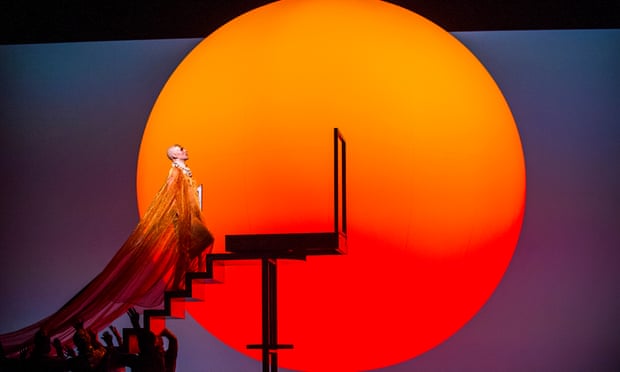 |
| Photo by Richard Hubert Smith |
Composed by Philip Glass, Akhnaten is mesmerising, enthralling, and enchanting. I simply had no idea what to expect, yet I left feeling excited about the production and mentally calmer than I had been before the opera begun. It’s fair to say that there’s certainly something stunning and enchanting about Glass’s music here.
Not many know of Akhnaten but he’s very different from other pharaohs. The life of Akhnaten, who was pharaoh of Egypt around 1350BC and married to Nefertiti, is known in ancient history for converting his people to believe a new religion, following a monotheistic sun god. The storyline, itself, is rather basic but the staging is finely executed by its remarkable music score and vocals, which is the key focus, I thought.
Glass (being Glass) has distinctive features to his music – made up of modern minimalism and experimentation – that somehow relaxes and soothes you – it has a way of making you want to pray or at least meditate. McDermott ensures the performers move very slowly and it is this slowness, which increases the grandeur and mysticism of this opera.
For one thing, there are no surtitles. The singing is partly done in ancient Egyptian (or Hebrew) and English, but there is a scribe (Zachary James) who explains in poetic verse, from the Book of the Dead, on what’s going on in every scenes. James performs with great diction and has the wonderful ability of projecting his voice to the entire auditorium; every person could hear his every word.
American countertenor, Anthony Roth Constanzo is a complete delight as he performs as the newly made – naked and vulnerable - Pharaoh. His voice is splendid and his acting is completely engaging. Emma Carrington is elegant as Nefertiti and with Constanzo they sound stunning together when they sing a duet in act II. Rebecca Bottone as the pharaoh’s worried mother is also exquisite in voice.
 |
| Photo by Tristram Kenton |
It was almost unpredictable with Glass: one moment I’d think someone’s phone had gone off or someone had loudly poured water into their cup, yet no – that was all part of Glass’s unpredictable score, which is an odd thing to say considering how his music is hugely repetitive. It has a trance-like effect and for the orchestra it was a tough challenge having to keep up but they seemed to be confident and secure.
What’s also different is the clever input from jugglers who knew how to throw their balls around without slipping, but their ball-playing depict Akhnaten’s power and are not simply there as part of some cheap entertainment ploy.
 |
| Photo by Tristram Kenton |
I’m glad I went through the trouble of seeing this opera, which woke me up to beautiful sights and sounds. Although others and I will agree that Akhnaten was worth all the stars, there were some that deemed it 'dull' or 'boring' (and I'm sorry that they felt this way) but comparing Akhnaten to The Marriage of Figaro would be the wrong way of justifying why they didn't enjoy it. They are entirely different pieces within the same genre, and there's nothing wrong with preferring a different style over another. For me, this production worked more than I could imagine.
Last showing of Akhnaten is Friday 18th March 2016. You can purchase standing day tickets for £10 each in person. Click here for more information. https://www.eno.org/whats-on/akhnaten/
Curtain call photo! Thank you for an great evening - soloists, designers, musicians, Chorus & jugglers #ENOAkhnaten pic.twitter.com/Tc90ijK3rF— Mary Grace Nguyen (@MaryGNguyen) March 17, 2016
Standing ovations for Anthony Roth Constanzo& the praiseworthy #ENOChorus.Here,he thanks them @Save_ENO #ENOAkhnaten pic.twitter.com/TCVoVMqbOz— Mary Grace Nguyen (@MaryGNguyen) March 17, 2016
Honestly, where would we be without the ENO Chorus? Utterly sublime tonight. @Save_ENO #ENOAkhnaten pic.twitter.com/pAvUsrbrxK— Mary Grace Nguyen (@MaryGNguyen) March 17, 2016
Totally out of this world.Philip Glass's score is enchanting and mesmerising;I felt like I was in a trance.BRAVO #ENOOrchestra #ENOAkhnaten— Mary Grace Nguyen (@MaryGNguyen) March 17, 2016
I thought I heard phones going off,ppl farting & water being poured into a cup but no-that was all Philip Glass! #ENOAkhnaten #unpredictable— Mary Grace Nguyen (@MaryGNguyen) March 17, 2016
Only a few hours until #ENOAkhnaten. Oh yes!!! pic.twitter.com/I3dlw9jr90— Mary Grace Nguyen (@MaryGNguyen) March 17, 2016







No comments:
Post a Comment